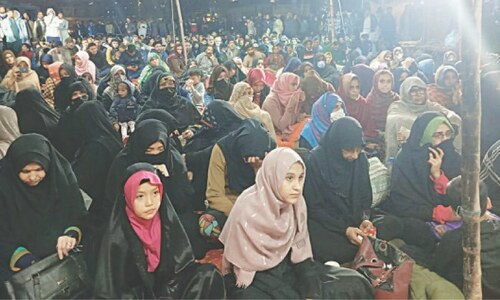KARACHI: Budget is just a game of numbers carrying no positive impact on the life of people if the government, particularly the bureaucracy, is not held accountable for any kind of lapses and the losses caused by their failure to execute planned projects on a timely basis.
This was stated at a consultative meeting on ‘Analysis of priorities of provincial budget and how to make it people centred’, organised by National Organisation for Working Communities (NOWC) in collaboration with the Sindh office of the National Commission on Human Rights on Monday.
Representatives of rights groups, labour unions, the media and finance experts participated in the discussion which was aimed at sharing the findings of a five-year trend analysis of the Sindh budget (2013-17) and coming up with recommendations for stakeholders to help make annual budgets pro-people. While parliamentarians from major political parties had been invited to reflect upon budget priorities, the provincial Minister for Social Welfare representing the Pakistan Peoples Party Shamim Mumtaz was the only lawmaker who turned up.
During the discussion, it was noted that there was a lack of input from civil society in the budget-making process. Neither political parties nor the bureaucracy seemed interested in taking them on board, with the result that most civil society organisations are not playing an active role in making sure that annual budgets prepared by bureaucrats and approved by parliamentarians are people-friendly, said Farhat Parveen of NOWC.
Need for ‘shadow budget’
Mohammad Sabir, a civil society activist and economist, was of the opinion that rights organisations should have a consortium to present a shadow budget to the bureaucracy and parliamentarians so that the people of Sindh have a prosperous future as promised by successive governments.
While the Muttahida Qaumi Movement did present shadow budgets in the assembly whenever the party was in the opposition, there was a need to bring them on a platform with all other political parties to make budget priorities more effective, he said.
To begin with, he added, civil society could place one demand — that the provincial budget should be made a ‘performance budget’ where output of funds allocation was evaluated. The education budget indicated that this sector is the government’s top priority, yet primary schools’ enrolment had not improved over the past many years, he said. The performance budget would allow the evaluation of funds’ utilisation, he added.
Reforms in bureaucracy
Habibuddin Junaidi asked why civil society had failed to demand reforms in the mighty bureaucracy. He said there should have been some pressure from civil society to hold those who prepare budgets accountable to ensure that they are prepared considering the requirement of the people instead of only some sections of society.
Anis Haroon said that the labour department, social welfare, ombudsman office and other such bodies were not given ample resources and asked the finance experts about its reasons. She also asked why funds were not released in the initial months for development budget with the result that either development funds were allowed to lapse or revised and cut every year raising the spending on non-development sector.
Mr Sabir explained that there were technical issues such as collection of taxes as well as procedural delays that need to be addressed. Endorsing his point of view, Shamim Mumtaz, who is also the chairperson of the newly established Sindh Child Protection Authority, said bureaucratic hurdles and procedural hitches caused a delay of at least one year in roadworks along the office of the child protection authority.
Earlier, Mr Sabir with the help of slides, informed the meeting that the objective of this trend analysis was to discuss the financial health of the Sindh government, highlight budget priorities, and review the education, health, law and order, and infrastructure budgets during the past five years.
“Overall the budget analysis indicates that the Sindh government is preparing for the next elections, as a major shift has occurred in priorities,” he said, adding that the infrastructure, particularly roads and housing sector, was being given more funds than the social sector.
The share of housing and amenities increased from a meagre 1.7 per cent to 24pc in the annual development programme (ADP) during the past five years, while the share of social protection declined from 29pc to 21pc in the total ADP.
Published in Dawn, April 11th, 2017















































Dear visitor, the comments section is undergoing an overhaul and will return soon.